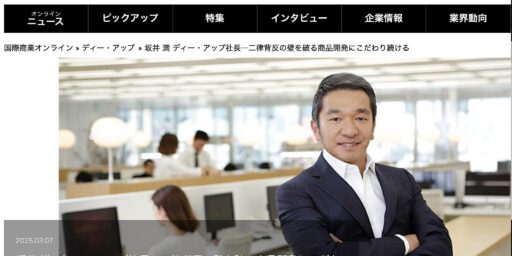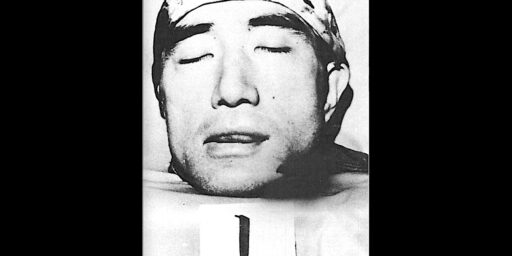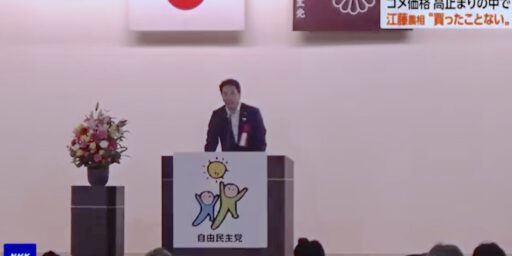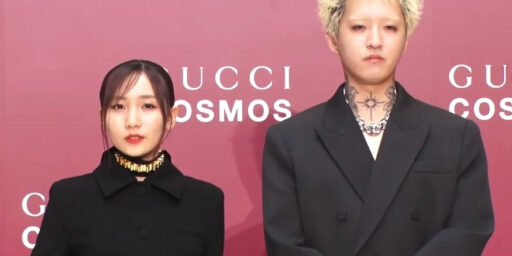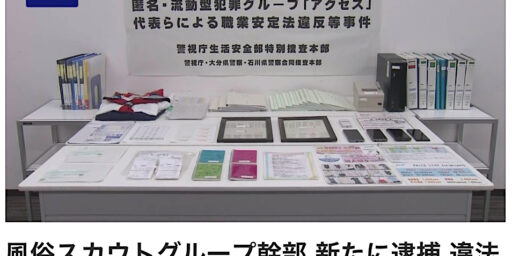Neujahrsansprache Seiner Kaiserlichen Majestät Kaiser Naruhito und Ihrer Kaiserlichen Majestät Kaiserin Masako New Year’s Video Message By His Majesty The Japanese Emperor Naruhito and Her Majesty The Japanese Empress Masako
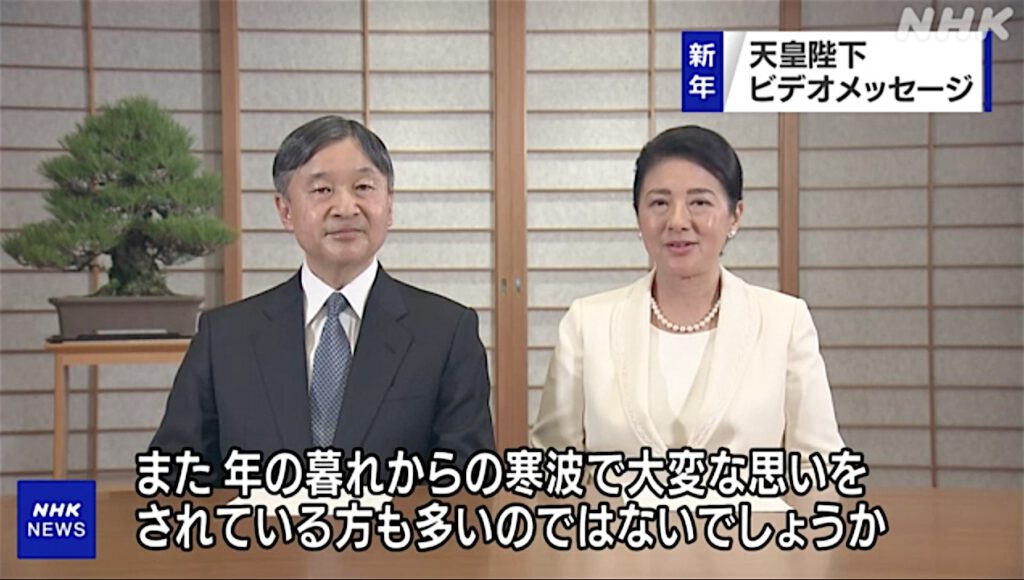
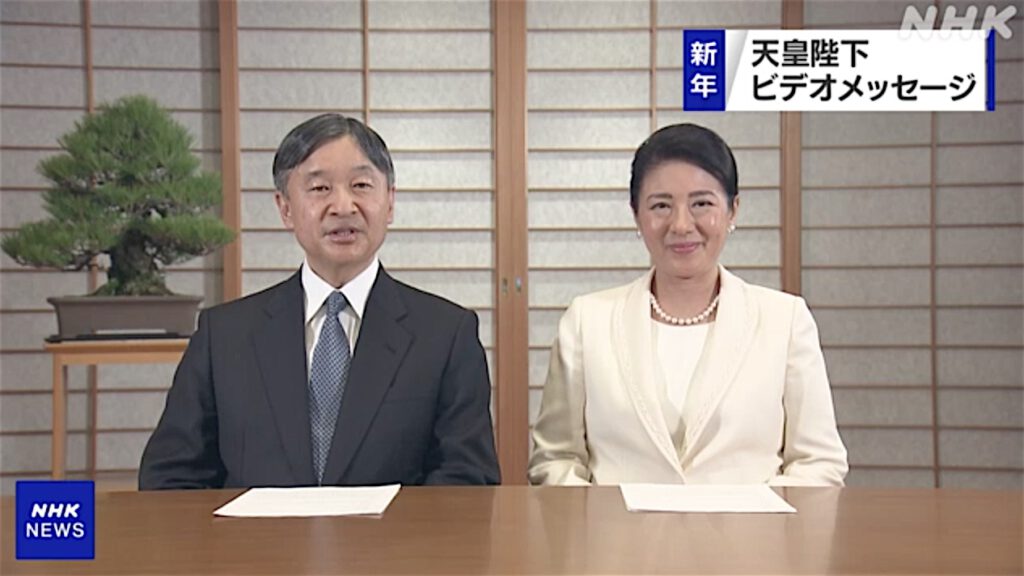
Videobotschaft Seiner Kaiserlichen Majestät Kaiser Naruhito zum neuen Jahr
1. Januar 2022 (REIWA 4) (Japanische Zeitrechnung: im 4. Jahr der Zeit der schönen Harmonie)
Heute morgen, am 1. Neujahrstag hat Seine Majestät der Kaiser von Japan in einer Videobotschaft das neue Jahr eingeläutet und wie schon im letzten Jahr seine Gedanken an die Menschen gerichtet, die mit dem neuen Coronavirus zu kämpfen haben.
Hier ist der vollständige Text der Nachricht in deutscher Übersetzung.
Der Link zum Original:
https://www.kunaicho.go.jp/page/okotoba/detail/90#337
[Kaiser von Japan]
Ich wünsche Ihnen ein gutes neues Jahr.
[Kaiserin]
Herzlichen Glückwunsch zum neuen Jahr.
[Seine Majestät der Kaiser]
Um die Ausbreitung der neuen Coronavirus-Infektion zu verhindern, muss ich Ihnen leider auch in diesem Jahr mitteilen, dass ich persönlich während der, normalerweise stattfindenden, Zeremonie im kaiserlichen Palast anlässlich der Gratulation zu Neujahr zu Ihnen nicht sprechen kann.
Deshalb möchte ich mich, wie im letzten Jahr, per Video an Sie wenden.
Im vergangenen Jahr hat die Infektion mit dem neuen Coronavirus weiter gewütet und viele Menschen in unserem Land und im Ausland infiziert und getötet.
Ich möchte denjenigen, die ihr Leben verloren haben, mein tiefes Beileid aussprechen und den vielen Menschen, die ihre Angehörigen verloren haben, mein aufrichtiges Mitgefühl aussprechen.
Ich möchte auch dem gesamten medizinischen Personal, das sich der Behandlung dieser Patienten gewidmet hat, meinen Respekt und meine Dankbarkeit aussprechen.
Erfreulicherweise ist die Zahl der mit den neuen Coronaviren infizierten Menschen in Japan im Vergleich zu früher deutlich zurückgegangen, was auf die weit verbreitete Verfügbarkeit von Impfungen und den unermüdlichen Einsatz der Bevölkerung zurückzuführen ist.
Die Zahl der Menschen, die an dem neuen Coronavirus schwer erkranken oder sterben, ist ebenfalls rückläufig, was ein positives Zeichen ist.
Gleichzeitig sind wir nun mit der Bedrohung durch ein neues mutiertes Virus, den Omicron-Stamm, konfrontiert.
Im Ausland nimmt die Zahl der Fälle in vielen Ländern zu, und viele Menschen sind nicht in der Lage, den Impfstoff oder die notwendige Behandlung zu erhalten.
Es bricht mr das Herz, wenn ich sehe, wie viele Menschen in Japan aufgrund dieser neuen Coronavirus-Infektion ihren Arbeitsplatz verloren haben oder unter schwierigen Lebensbedingungen leben.
Ich hoffe, dass denjenigen, die Hilfe brauchen, viele warme Hände gereicht werden.
Ich möchte meiner aufrichtigen Hoffnung Ausdruck verleihen, dass wir alle aus unseren Erfahrungen lernen und unsere Bemühungen zur Bekämpfung von Infektionskrankheiten fortsetzen können, während wir gleichzeitig unsere Beziehungen zueinander pflegen, unseren Schmerz teilen und uns gegenseitig bei der Bewältigung dieser schwierigen Situation unterstützen. Ich wünsche Ihnen alles Gute für Ihre Bemühungen.
Ich freue mich auf den Tag, an dem die Ausbreitung der neuen Coronavirus-Infektion unter Kontrolle ist und wir uns wieder persönlich treffen können.
Im vergangenen Jahr jährte sich das Große Ostjapanische Erdbeben zum 10.
Dank des unermüdlichen Einsatzes der Menschen schreitet der Erholungsprozess Schritt für Schritt voran, aber ich fürchte, dass viele Menschen immer noch unter schwierigen Umständen zu kämpfen haben.
Es ist auch erschütternd zu wissen, dass so viele Menschen unter den Folgen der Taifune und schweren Regenfälle im vergangenen Jahr gelitten haben und gestorben sind.
Wir werden weiterhin in Gedanken und Gebeten bei den Menschen in den betroffenen Gebieten sein.
Es liegen noch viele Herausforderungen vor uns, aber ich bin sicher, dass die Anstrengungen der Athleten und anderer Beteiligter an den Olympischen und Paralympischen Spielen Tokio 2020 im vergangenen Sommer vielen Menschen Mut und Hoffnung gegeben haben.
Ich hoffe aufrichtig, dass dieses Jahr ein Jahr sein wird, in dem Sie mit großen Hoffnungen und Träumen voranschreiten können.
Zum neuen Jahr wünsche ich Ihnen Glück und Frieden in unserem Land und in der Welt.
[Kaiserin]
Ich bin sicher, dass das vergangene Jahr für viele von Ihnen ein weiteres Jahr der Entbehrungen war.
Ich bin mir sicher, dass viele von Ihnen auch sehr unter der Kältewelle gelitten haben, die Ende des Jahres eingesetzt hat.
Wir hoffen, dass Sie gut auf sich selbst aufpassen.
Ich wünsche Ihnen allen ein friedliches und fruchtbares neues Jahr.
up-date: 2022/2/22
Mental health issues show women bear brunt of Japan monarchy system
The diagnosis of former princess Mako’s post-traumatic stress disorder prior to her controversial marriage in October has once again highlighted the intense pressure that women in the Japanese imperial family face, with some other members also plagued by mental health issues.
The former princess, 30, who is a niece of Emperor Naruhito, came under massive public scrutiny after it became known that the family of her commoner husband Kei Komuro was involved in a financial dispute.
Her aunt Empress Masako, 58, has long been battling a stress-induced illness related to the pressure she was under to produce a male heir, while former Empress Michiko, 87, the emperor’s mother, became unable to speak for months amid bashing by weekly magazines following her husband’s accession to the throne in 1989.
Both the empress and the former empress were commoners before their marriages to then crown princes.
Under Japan’s 1947 Imperial House Law, women are not eligible to ascend the throne and female members of the imperial family leave the household upon marrying a commoner.
While the former princess and Komuro eventually married on Oct. 26, more than four years after their relationship was made public, traditional ceremonies associated with a royal marriage were not held due to public unease over the money row.
“It is as if there are no human rights (within the imperial family),” said clinical psychologist Sayoko Nobuta.
The Imperial Household Agency revealed prior to the marriage that the former princess had been diagnosed with complex PTSD caused by what she described as psychological abuse the couple and their families received.
Regarding his daughter’s mental health, Crown Prince Fumihito, the emperor’s brother, stressed on the occasion of his 56th birthday in November the need to establish “criteria to refute” erroneous reports.
While the agency has exposed fake news in the past, debunking some reports on its website since 2007, it does not have a clear policy on how to handle such matters.
“Even if (former princess Mako) was told to ignore or not engage with online bashing, one can’t help but notice it in their daily life, and it will chip away at one’s heart before they know it,” said Rika Kayama, a psychiatrist and commentator on social issues.
The former princess’ case is just the latest in a history of mental issues that have befallen women in the imperial family.
In 2004, the agency announced that Empress Masako, then the crown princess, had been diagnosed with adjustment disorder after giving birth in 2001 to Princess Aiko, the only child between her and the emperor. The empress had canceled her official duties the previous year following a bout of shingles.
The empress, a Harvard- and Oxford-educated former diplomat, gave up her career to enter the imperial family in 1993 after accepting a marriage proposal by the then crown prince, having initially declined the offer.
Many speculated that a major cause of her stress was pressure to produce a male heir, as no boys had been born to the imperial family since the birth in 1965 of Crown Prince Fumihito.
The situation abated after Crown Princess Kiko gave birth in 2006 to Prince Hisahito, 15, who is now second in line to the throne.
But unlike former Emperor Akihito and former Empress Michiko, who usually engaged with the public as a couple, the current emperor often performs official duties on his own due to his wife’s condition, although she has been gradually expanding the scope of her activities in recent years.
Still, even the former empress, who became the first commoner to wed an heir to the imperial throne in 1959, was not immune to the pressures of the imperial family.
After the former emperor’s accession to the throne in January 1989, she became the focus of a backlash in weekly magazines triggered by his cultivation of a more approachable image compared to his father Emperor Hirohito, who had taken the throne before World War II when emperors were still regarded as living gods.
On the day of her 59th birthday in October 1993, the former empress collapsed and lost her voice due to psychogenic aphasia.
“The emperor is the symbol of Japan, and the monarchy is a symbol of patriarchy. Therefore, discrimination against women is most pronounced in the imperial family,” Nobuta said, adding that such an environment makes it difficult for bright women to survive.
Nobuta said that former princess Mako, who grew up watching these events and had studied at International Christian University in Tokyo as well as in Britain, must have felt the only way to truly live her life was to leave Japan.
“For former princess Mako, escaping was her main goal, and I think she chose Komuro as the man who could help her achieve this goal,” Nobuta said.
The couple left Japan shortly after registering their marriage to start a new life in New York, where Komuro works as a law clerk at a legal firm.
All eyes are now on Princess Aiko, who turned 20 in December and is now expected to perform official duties as an adult member of the imperial family.
The princess would be entitled to the throne if she were a member of the British or Dutch monarchy, both of which allow the eldest child of the monarch to succeed regardless of gender.
A government panel tasked with studying ways to ensure a stable imperial succession proposed on Dec. 22 allowing female members who marry commoners to retain their imperial status.
But it postponed drawing conclusions regarding whether women or imperial members in the matrilineal line will be eligible to ascend the throne.
In the past, Princess Aiko has sparked concerns and speculation among the public for her prolonged absence from school and a sharp weight loss at one point, but it remains to be seen if the mental health issues that befell the female relatives before her will repeat themselves.
Hajime Sebata, an associate professor of modern Japanese history at Ryukoku University, said that building rapport with citizens through communication, not counterarguments, is key.
“If (the agency) regularly posts (information on royals) on social media and communicates, the public will come to trust the imperial family even if there are criticisms,” he said.
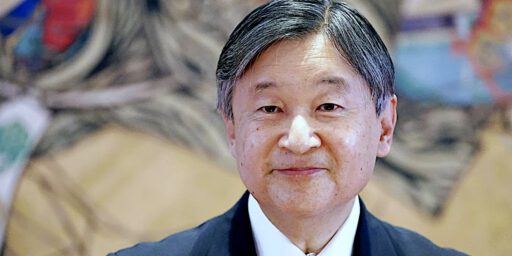
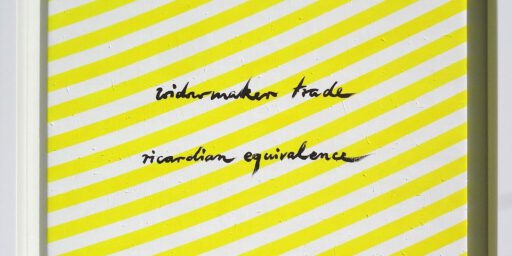
-512x256.jpg)
